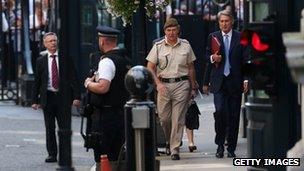Bombing Syria: The politics
- Published

Ministers and military figures attended a National Security Council meeting on Wednesday
All the signs point to the US preparing for a military strike against Syria within days.
Why else summon our MPs to return tomorrow when they were due to be back on Monday?
All the signs are that the UK government will back the strike and British forces will play some limited role in it.
Ten years after Iraq, what is remarkable is the apparent degree of consensus between the three main party leaders.
Iraq opposition
When they met yesterday Messrs Cameron, Clegg and Miliband agreed that the use of chemical weapons could not be ignored; that military action could be justified in order to deter a repeat, provided that it was limited, did not trigger wider involvement in Syria's civil war and was legal.
This, despite the fact that both Nick Clegg and Ed Miliband owe their position, at least in part, to their opposition to the war in Iraq.
However, the public appear to remain deeply affected by what happened a decade ago.
The latest YouGov poll, external shows opposition to military strikes running at two to one. Indeed, there is wide opposition to doing anything at all.*
This may be being fuelled by the warnings of senior figures in all parties as well as former military men who are questioning whether there is any such thing as a limited military intervention or one that does not suck the western powers deeper into the Syrian crisis.
Even though there is no debate between the party leaders about whether in principle to attack Syria, the questions of when, what and how could still divide them and deny David Cameron the parliamentary majority he needs tomorrow.
When the Labour leader spoke on camera yesterday he did not talk about the need to involve the UN.
In part, perhaps, because Ed Miliband knows as well as anyone else that Russia has consistently vetoed any resolution that criticises its Syrian allies.
Delay call
However, this morning Douglas Alexander, the shadow foreign secretary, has been stressing the need, not just for the involvement of the UN Security Council, but for them to see the evidence of the UN weapons inspectors - something which may take a long time.
The US government has dismissed the need to wait.
They argue that the inspections may be worthless not only because days have elapsed since chemical weapons were used but also because the UN is not expected to report on which side may have used them.
Nevertheless, Labour are toying with the possibility of tabling an amendment to the government's resolution which would back action but call for a delay until the UN's processes have been gone through.
Lib Dem pressure
In the past few minutes they have also called on the government to publish the legal basis on which it is acting before tomorrow's Parliamentary vote.
The Lib Dems would be very uncomfortable if Labour were able to position themselves as the more internationalist party. Pressure would grow on Nick Clegg to take the same position.
With the potential support of Tory and Lib Dem rebels plus the Scots and Welsh Nationalists, Labour could put the government's majority in peril.
Thus, what is said in the next 24 hours in Westminster, in Washington and at the UN in New York will really matter.
Many MPs will only decide how to vote once they have heard the evidence of the Assad regime's involvement, the legal basis for an attack, the UN process to be followed and the timing of any military action.
A decade on from Iraq, a British prime minister finds himself under pressure thanks to the desire of an American president for swift military action.
What an irony that this time around it is a president from the left and a prime minister from the right.
MPs on all sides find themselves considering not just the merits of reacting to the use of chemical weapons; not just their view of our interests in the Syrian conflict; not just their trust in the Obama and Cameron governments.
They are also wrestling with what they and their parties did or did not do over Iraq.
* Admittedly the questions were asked before any leader had made the case for action